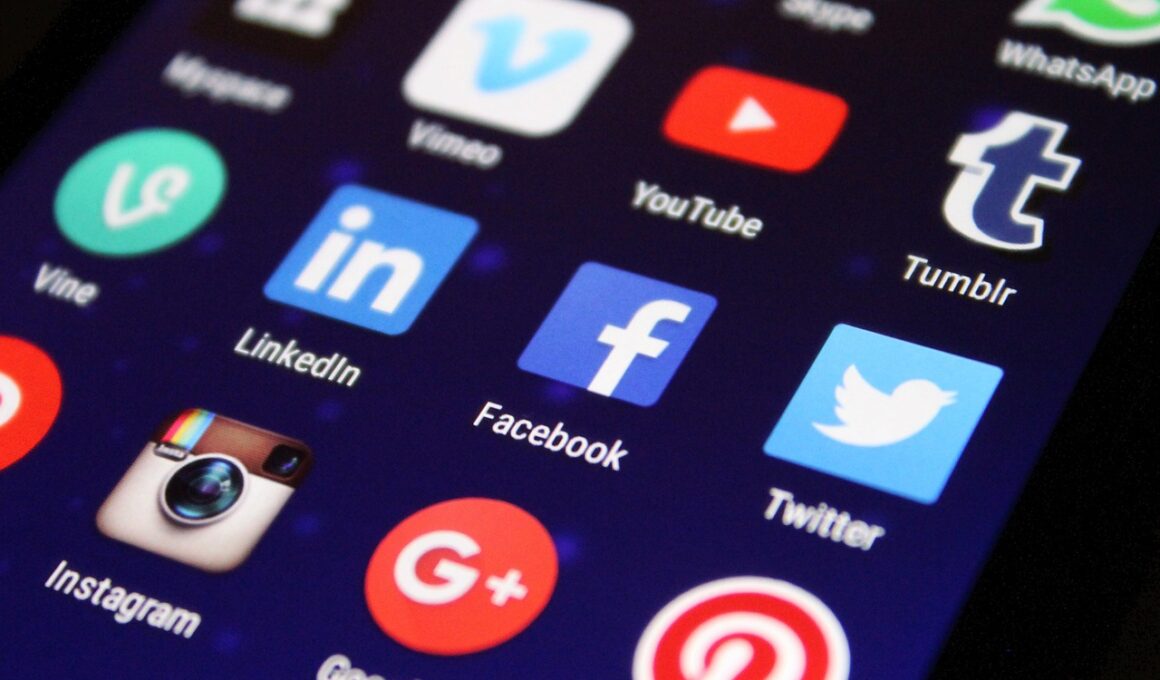Using Social Listening to Monitor Brand Health: A Case Study Approach
Social listening has emerged as a crucial component for brands aiming to gauge their health in the marketplace. By utilizing various analytics tools, businesses can track conversations about their products and services across social media platforms. This data-driven approach allows brands to identify trends, monitor consumer sentiment, and adapt strategies in real time. Brands leveraging social listening can achieve a deeper understanding of their audience’s preferences, needs, and concerns. Such insights provide an opportunity to refine marketing campaigns, thereby enhancing engagement. An effective case study often involves companies such as Nike and Starbucks, which have leveraged social listening to their advantage. For instance, Nike uses social listening to engage with athletes and sports enthusiasts effectively. They gauge customer feedback and ensure products resonate. Monitoring brand mentions, both positive and negative, equips companies with tactical knowledge to boost their reputation. Furthermore, tapping into social listening can cultivate ongoing dialogue with consumers, enriching brand loyalty. In summary, this proactive strategy can offer a significant edge in an increasingly competitive landscape.
Brands can utilize insights gained from social listening to improve their product offerings. When companies discern common feedback patterns, adjustments can be made to better suit consumer wants. This iterative process often leads to product innovation and enhanced customer satisfaction. One notable example is Unilever, which employed social listening to refine its beauty product range. By paying attention to consumer dialogues, the company identified specific pain points, allowing it to launch products better aligned with customer expectations. Social media platforms serve as a dynamic environment for consumer interaction, where users freely share their thoughts and experiences regarding various brands. Monitoring these conversations can reveal invaluable information, such as shifts in brand perception or emerging competitors. Furthermore, by addressing concerns immediately through targeted responses, brands can demonstrate that they value customer feedback. As trust builds, consumers are more likely to share their positive experiences. Thus, social listening not only improves brand health but can also strengthen consumer relationships. In conclusion, companies that proactively adapt based on social listening insights seem more connected and responsive, fostering a loyal customer base.
Case Study: How Brand X Improved Its Market Presence
Brand X faced declining market presence due to negative consumer sentiment expressed on Twitter and Instagram. Through social listening, they identified key areas of dissatisfaction concerning their customer service. For instance, complaints about response times were rampant. Armed with this information, the brand revamped its customer service strategy, implementing a real-time support system across social channels. Additionally, they educated their staff about effective engagement tactics. After a month of dedicated effort, Brand X began observing positive shifts in mentions and overall sentiment analysis. Customers praised the improvements and often shared positive experiences online. This case study illustrates how real-time feedback can guide operational changes, ultimately enhancing brand reputation and consumer trust. Brand X’s story stresses the significance of addressing criticisms efficiently and demonstrating commitment to consumer satisfaction. Furthermore, it highlights how social listening can transform customer experiences into narratives that resonate. Moreover, brands that actively participate in conversations ensure that they evolve with their audience’s expectations. This cycle of adaptation promotes a healthier brand narrative in the long run, ensuring consumer loyalty and advocacy.
Moreover, utilizing social listening provides companies with competitive intelligence on industry trends. Brands can track competitors without intrusion, gaining insights into their strategies and consumer responses. By analyzing sentiments surrounding competitor brands, it is possible to identify opportunities for differentiation and innovation. For instance, Brand Y leveraged social listening to pinpoint gaps in their competitor’s product offerings. Adjustments made to their product line not only enhanced customer satisfaction but also drew attention from potential customers of competitor brands. This strategic advantage is essential in a saturated market where consumer preferences shift rapidly. Market leaders consistently refine their offerings based on insights garnered from social listening, ensuring they remain ahead in the game. Companies are leveraging this tool to forecast potential market changes, predicting shifts in consumer preferences. Additionally, comprehensive analysis of audience segments allows for targeted marketing efforts, enhancing campaign effectiveness. Therefore, social listening has transitioned from a support function to a strategic imperative in brand health monitoring. In conclusion, the interconnection between social listening and competitive strategy cannot be overstated.
Consumer Engagement Initiatives
Incorporating social listening into consumer engagement initiatives has proven beneficial for brands. By identifying trending topics and discussions, companies can create relevant content that resonates with their audience. This proactive approach not only enhances brand visibility but encourages meaningful interactions. Companies utilizing audience feedback to inform their marketing campaigns find themselves more in tune with consumer expectations. For instance, Company Z crafted an entire ad campaign driven by insights discovered through social listening. The results were impressive; engagement rates skyrocketed, and the campaign received industry awards. Such successes underscore the importance of aligning marketing endeavors with the sentiments expressed by target consumers. Additionally, real-time monitoring allows for the adjustment of strategies based on audience reactions. Brands that show they listen and adapt earn better consumer relationships—reflecting in improved brand loyalty and advocacy. Herein lies the true value of social listening: when brands engage authentically, they foster communities. Consumer storytelling encourages deeper connections, making it essential for brands seeking longevity. Businesses that prioritize listening ultimately craft narratives that lead to shared values and beliefs, forging bonds that transcend transactions.
Furthermore, using social listening is integral to crisis management strategies. When negative sentiments arise, timely interventions become pivotal in preserving brand integrity. Companies can proactively acknowledge issues and communicate transparently, mitigating potential fallout. For example, Company A faced backlash regarding its recent marketing campaign, perceived by some as insensitive. Through social listening, the brand noticed the rising discontent before it escalated. Quick responses and authenticity in communication allowed Company A to navigate the crisis effectively. They issued clarifications and engaged with impacted audiences, thus addressing their concerns directly. Such a timely reaction transformed a potentially damaging situation into an opportunity for building trust. Moreover, audience sentiment can guide the recovery strategies that follow a crisis. Businesses equipped with social listening tools can learn from past experiences, preventing future missteps. Brand communication can evolve from reactive to proactive, preparing brands for various social dynamics. Crisis management thus becomes more effective, as it stems from regular engagement and listening processes. Altogether, incorporating social listening into crisis management fosters resilience, ensuring brands remain relevant even during challenging times.
The Future of Social Listening in Brand Strategy
The landscape of social listening continues evolving, with advancements in technology paving the way for greater insights and efficiencies. Increasing automation allows brands to monitor conversations on various channels seamlessly. Furthermore, artificial intelligence plays a significant role in analyzing sentiment more accurately, distinguishing nuanced emotions surrounding brands. As these technologies advance, the quality of insights gathered through social listening will likely improve. Brands that invest in these innovations stand to gain competitive advantages in understanding consumer dynamics. Moreover, the integration of social listening with other analytics tools promises richer, more holistic insights into brand health. This convergence allows companies to adapt their strategies more effectively based on comprehensive data sources. The ongoing evolution highlights how crucial real-time engagement will become, with consumers expecting brands to respond almost instantaneously. Thus, social listening will differentiate between brands that thrive and those that struggle in future markets. In summary, the future of brand strategies hinges on an organization’s ability to actively listen and implement changes based on consumer feedback consistently.
Companies that effectively embrace social listening as a core strategic function are likely to lead their industries. This integration cultivates an adaptive learning environment where feedback becomes foundational. Furthermore, brands demonstrating agility become more attractive to consumers drawn to authenticity and transparency. By acknowledging consumer voices, organizations can curate experiences that directly align with audience desires. Over time, these practices evolve into company culture, promoting a deeper commitment to customer-centricity. Consequently, businesses will find that their efforts in social listening yield long-term benefits, enhancing overall brand equity. Furthermore, as consumer preferences continue to shift, the importance of social listening only magnifies. Understanding the underlying emotions and sentiments driving consumer decisions will empower brands to respond dynamically. Ultimately, social listening will redefine consumer-brand relationships, forging connections characterized by trust, loyalty, and advocacy. Organizations that prioritize these insights as actionable intelligence will position themselves advantageously against competitors. A forward-thinking approach will ensure that brands remain engaged and relevant, regardless of market fluctuations. Thus, social listening serves as a cornerstone for achieving and maintaining brand health in a fast-paced digital ecosystem.


